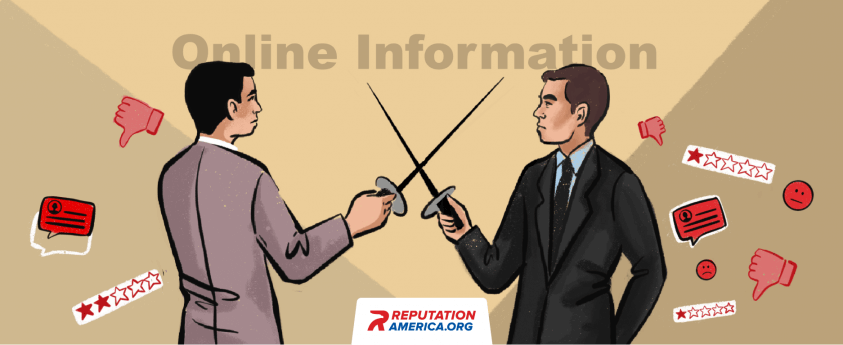The Importance of Being Able to Remove Online Information

It’s pretty much impossible these days to make use of any digital services without your information being stored somewhere online.
This information may be somewhere everyone can view it, or it may be visible to a select few, but for the privacy-conscious, this is still not ideal. Unfortunately, these days it can be trickier than ever to remove online information. It may be stored in numerous places, the holder of your data may be reluctant to remove it, or sites you trust may have shared your details with third-parties. While there are some benefits to be had from having your info online – such as tailored digital experiences – there are also plenty of instances where you may wish to erase or reduce your online presence.
Table of contents
We have solutions to repair your reputation
Start with a free consultation
Why Might You Want To Remove Online Information
There are a number of good reasons people want to delete information from the internet. For starters, if fraudsters are able to get a hold of your personal details, like your physical address, email address, phone number, and full name, this could lead to some unfortunate consequences. Furthermore, if these people attain any of your credit card information or bank details, you could be at serious risk of financial fraud. While you may only provide these details to companies and services that you trust, it’s no secret that dozens of reputable businesses have experienced massive-scale data leaks and information theft.
Even if you are extra careful with how you share personal information online, or privacy isn’t too much of a concern, this doesn’t stop others from potentially posting slanderous or damaging information about you online. There’s nothing worse than seeing untruths being posted about you on the internet and being unable to do anything about it. Of course, it may be possible to report and remove this information, but unless you can act rapidly, the damage may be irreversible. For businesses, this issue can arise in the form of unfair or untrue reviews. Genuine customer reviews are essential in today’s world, with 84% of people claiming to trust the word of strangers online as much as they would the recommendation of a personal friend. It’s also been proven that customers have more faith in companies with a spread of both positive and negative reviews, but there’s a difference between a fair opinion and a malicious lie that could hurt your reputation and your bottom-line.
Prevention is Better Than the Cure
Before you begin looking into removing online information, it’s worth being aware of a few things you can do to protect yourself in the first instance. For starters, you should always be using trusted anti-virus software to prevent undesirable types from accessing your details through a viral backdoor. It’s also possible to purchase privacy software that ensures your activity isn’t stored on your computer or online, and some reliable options cost as little as $20 for a yearly subscription. To the relief of many privacy-conscious internet users, the European Union has now introduced GDPR, the world’s most robust set of data protection and privacy regulations. You’ve probably noticed in more recent years that every website now gives you the option to refuse access to your cookies and identifying information – if you’re concerned about your info being online, go ahead and decline their requests.
The Different Ways to Remove Online Information
Given the nature of how we use the web, it’s almost guaranteed our information will be on there somewhere, regardless of how careful we are about sharing details. This means taking some extra steps to erase our online presence, which requires a fair amount of time and effort.
The biggest culprits of hoarding personal information are social media sites like Facebook, and they can also leave you the most vulnerable. If you merely want an overview of what data is being held and how it’s been shared by a social media company, you can submit a personal data request. However, if you want to remove it entirely, you’ll need to delete your account. It’s important to note that most of these companies will try and persuade you to deactivate your account first so you can reactivate it a later date if you change in mind – this isn’t the same as deleting your account, so you need to go the whole way if you want to get rid of everything. The same goes for any personal websites or blogs you may have operated in the past – to remove every trace of them, you’ll want to take the site offline, but you should also make sure all related files have been permanently deleted from your hosting provider’s servers.
In some cases, there will be information online where there may not be a clear route to removing it, and you’ll need to send a direct request to the website operator. This is where most people run into issues. While many site operators won’t have a problem with removing online information upon request, others can be less cooperative. They may insist that they have a right to display this information, they could claim not to be a decision-maker in the removal process or – in some instances – they may intentionally wish to cause you personal or professional harm.
What Happens When You’ve Done All You Can?
So you’ve managed to delete everything you could, but how do you know you’ve found everything, and what recourse do you have if someone’s refusing to play ball? At this point, it’s best to turn to the professionals. Online Reputation Management (ORM) is more necessary than ever in 2019, and removal specialists are incredibly proficient in removing online information. They possess a skill set that includes insight into how sites operate and their users’ behavior, meaning they can effectively adapt their approach to every situation. Removal specialists also know how to reach the right person, with the ability to move up the chain from peripheral staff to an executive manager. They also have numerous techniques at their disposal than the average internet user wouldn’t be able to utilize in the same manner. The key takeaway is that the experts don’t just remove online information – they solve the whole problem.
What do clients and partners think about you?
It’s free, confidential, and without obligation






Eliza
10.10.2019It’s hard to realize that if we have a social media page, we allow somebody to do everything they want with our information. So aren’t we protected at all?... our data I mean
Joseph
10.10.2019To delete your online presence is impossible without deleting your blogs or accounts in social media. But it’s also impossible to exist in our digital world without all this staff. OK, I don’t have a Facebook account but I need e-mail at least. I need it for my job, fo… To delete your online presence is impossible without deleting your blogs or accounts in social media. But it’s also impossible to exist in our digital world without all this staff. OK, I don’t have a Facebook account but I need e-mail at least. I need it for my job, for communicating with my family. And don’t forget about banks, your info is also stored there, I think there’s no need to say that almost EVERYONE has a bank card
Eliza
10.10.2019You’re right, that’s the thing I wanted to say. All this means that if you want to have your data offline, you should stay at home all your life without any socializing
Linda
11.10.2019The article mostly says about common people and their data, but what about companies? For example, there’s some negative online information about them and they don’t know how to remove it quickly. Should they remove all the information, including negative and positive one?
Thomas
12.10.2019No need to delete ALL the information because there’re many companies that specialize in removing only negative data. It can cost a lot of money but it worth it if you care about the reputation of your company in the internet
Charles
12.10.2019Do you know the period of data storage after you remove your online information? From 6 months till 3 years. Even if you delete everything, these data will be stored for a rather long time and they will be still vulnerable. It’s a law against intruders but they still c… Do you know the period of data storage after you remove your online information? From 6 months till 3 years. Even if you delete everything, these data will be stored for a rather long time and they will be still vulnerable. It’s a law against intruders but they still can have an access to your information. This law is a two-edged sword
Nancy
14.10.2019Who can steal, for example, my information? I don’t have any haters or enemies. And if we speak about hackers, why do they need data of common people? If it happens to companies, it’s clear for me, they can have competitors
Matthew
14.10.2019My brother worked in a company that suffered from information leak and spreading of negative information in the internet. I remember his state at that period. He was looking for ways how to remove negative online information, this article would have been useful for him…
Wolf1
15.10.2019If I want to remove my data from the internet and some site operators refuse to do it, shouldn’t I apply to the court? Why do they decide for others, what to do with this or that information?! It’s my information and want to control it!
Jen_kent
15.10.2019I doubt that there’s any possibility to delete your data from the internet. You want to remove some article or sth like that, even if a searcher removes a link from its search results, the page with article won’t disappear. The searchers can’t forbid to follow the link… I doubt that there’s any possibility to delete your data from the internet. You want to remove some article or sth like that, even if a searcher removes a link from its search results, the page with article won’t disappear. The searchers can’t forbid to follow the links, if somebody sends the link to somebody
mark
15.10.2019Well, maybe some negative info isn’t that bad as you all think? Do you know such a thing as “bad PR”? Just remember how many celebs became popular thanks to this very bad PR. If Charlie Sheen now decides he wants to remove all the mentionings of the crazy things he did… Well, maybe some negative info isn’t that bad as you all think? Do you know such a thing as “bad PR”? Just remember how many celebs became popular thanks to this very bad PR. If Charlie Sheen now decides he wants to remove all the mentionings of the crazy things he did from the internet, who will remember who Charlie Sheen is??? Scandals is a perfect ground to become popular
Donald
16.10.2019I’m not Charlie Sheen, I don’t need any PR, bad or good. I just want to protect my data and my privacy ‘cause I have I right for it. And I want to protect my family’s privacy. I hate the thought that some crawlers can do harm to my children using my personal data that … I’m not Charlie Sheen, I don’t need any PR, bad or good. I just want to protect my data and my privacy ‘cause I have I right for it. And I want to protect my family’s privacy. I hate the thought that some crawlers can do harm to my children using my personal data that was leaked somehow.